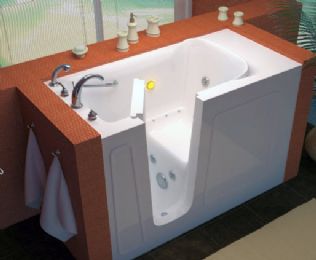
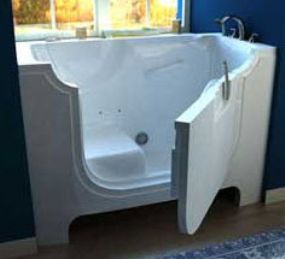
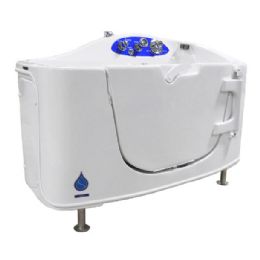
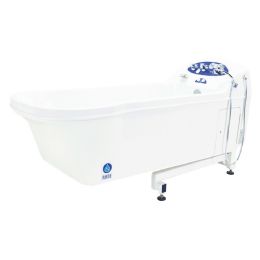
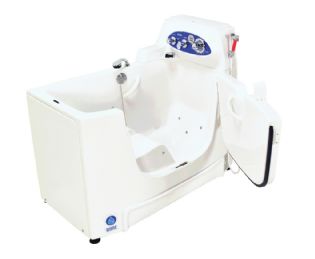
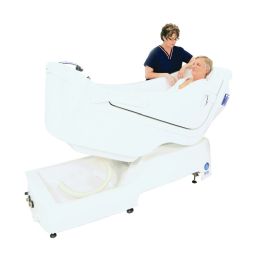
How do Walk-In Bathtubs Work?
While there are a wide variety of walk-in bathtubs in an assortment of styles and configurations available today, they are all designed with one major common feature; to provide safer and more accessible bathing. Conventional bathtubs are often difficult or impossible for aging or disabled individuals to use, as their sides are too high for many to step over. They can also be challenging to sit or lay down in, and to get back up from.
Walk-in tubs help make bathing accessible to all potential users, even those in wheelchairs or who experience limited mobility because of various physical challenges such as disabilities or injuries.
Cleverly designed with special inward or outward-opening doors, these capped doors include special seals and other elements of brilliant design to keep water from leaking out. They feature extremely low curbs that users can easily step over, or the tub will be designed with easier access for seated or lateral transfers from a wheelchair or other transferring device, such as a Hoyer lift. Most tub configurations have built-in seating systems, so the user can simply enter the tub, sit down and close the doors.
Once the door is closed, the individual can then let water into the tub and enjoy the bathing experience in comfort and safety. Many walk-in tubs feature other elements of therapeutic bathing, such as water or air jets, aromatherapy and chromotherapy to further enhance bathing and hydrotherapy, while others include shower configurations to allow for secured bathing with a shower instead of a bath, or for a combination of both. All walk-in tub designs highlight non-slip floors and seats for the utmost in safe maneuvering within the tub.
Once the user is done with the bath, water can be let out through the drain as usual, and then the user can safely and easily exit the tub through the door and back over the low curb.
The manufacturers of walk-in bathtubs include a variety of integrated features into these unique enclosures to ensure that they will hold water and prevent leakage, such as double seals, properly fixed hinges along the doors and double gaskets. Users are instructed to never fill the tubs past the suggested limits, and to always make sure the door is closed tightly. Some models may be installed with an external drain below the door as another failsafe against water leakage.
How to Choose the Right Walk-In Bathtub
With a generous variety of styles, sizes and layouts to choose from, everyone is sure to find exactly the right walk-in bathtub to suit their own unique and special needs. Walk-in tubs take up the same amount of room in a bathroom as a traditional tub, so most of the time no special changes or remodels will be necessary. Walk-in tub installation is a lot easier than most people would guess, and there are specific designs that fit easily into smaller bathrooms.
In addition to deciding on therapy features, facets and hardware, temperature regulators and other add-ons such as pivoting seats, you must also decide on whether you prefer fiberglass or acrylic construction. While acrylic designs also contain fiberglass, they tend to stay in better shape than just fiberglass construction alone. Both fiberglass and acrylic are incredibly durable for repeated water usage, but fiberglass can discolor over time. Acrylic designs do tend to be more expensive than fiberglass because of this, but may also last longer, making them the more cost-effective choice for the long-term.
Here is some more information about some basic walk-in tub styles to help you narrow your search:
Slide-In Tub
Featuring a seat-high surface and door, this type of walk-in bathtub is popular with a lot of different individuals. It is indicated for use by individuals who have leg weakness or who depend on a walker or wheelchair for mobility, but it is also well suited for those who walk without difficulty as well.
Wheelchair Accessible Tub
This style provides wheelchair users who need direct transfer from their chairs into the tub and back again an easier access point to do so. Outward-swinging doors further facilitate simpler transfers, while grab bars and non-slip seats within the tub add security.
Simple Soaking Tub
When you don’t require any water or air jets, the soaking tub offers relaxation and therapy simply from the water’s own natural heat and buoyancy.
Air Massage Tub
Air powers the jets in this type of walk-in tub, providing more subtle and gentle massaging effects for therapy. Air jets are perfect for elderly individuals, and for those with sensitive skin or for whom water powered jets are too strong. The gentle massage provided by air massage within the water enhances circulation and helps alleviate soreness and pain.
Water Massage Tub
Water-powered jets, also known as whirlpool jets, give the walk-in tub user deep, penetrating massage for stronger therapeutic benefits. The action generated is quite aggressive and well suited for sports injuries and other painful muscle and joint health issues.
Combination Shower and Tub
This configuration highlights a walk-in tub and shower, so that individuals may use one or the other, or both combined for a better bathing experience. Styles vary widely for the combination shower/tub, from compacted designs to fit into smaller spaces to expansive designs suitable for larger bathrooms.
Combination Therapy Tub
This luxurious design incorporates many different therapy features into one walk-in tub. This style typically offers both water and air powered jets, along with aromatherapy and chromotherapy to enhance the bathing experience.
The Many Health Benefits of Bathing and Hydrotherapy
Hydrotherapy, or the use of water as therapy, has been around as long as human beings. Being in water provides a wonderful weightless feeling, decreasing body weight by as much as 90%. This therapeutic lack of gravity in itself is quite a balm to aching muscles, bones and joints. Immersing in warm or hot water also helps to increase body temperature and circulatory blood flow, which also leads to the healing of damaged tissues like muscles and joints.
The warm or hot water also relaxes the muscles, with calming effects on the nervous and endocrine systems as well. Baths are a wonderful way to alleviate stress and to induce relaxation and sleep. The moist heat generated from soaking in a bath can also be very beneficial for respiratory conditions such as asthma and bronchitis.
Aromatherapy and chromotherapy can also greatly enhance the hydrotherapy experience. Aromatherapy uses oils extracted from plants to positively influence physical, emotional and mental health. The pleasant aromas from these plants are usually employed in walk-in tubs through oil-infused beads that are placed inside the water or the jets to give the user a more total therapeutic bathing experience. Chromotherapy utilizes various colors and lighting features to enhance healing and relaxation, providing whole-body color immersion through the specific systems of the walk-in tub. Medical professionals are using chromotherapy along with other non-invasive health techniques to successfully treat a lot of various health issues, such as migraines or mood disorders.
Hydrotherapy is a wonderful, feel-good tool for restoring, maintaining and regulating health. Walk-in bathtubs help people to enjoy these benefits once again, or sometimes for the first time. Individuals who are not able to take a bath in a conventional tub because of various physical impediments can now take advantage of the safe and secured bathing capabilities of a walk-in or step-in bathtub.
Hulet Smith, OT
Rehabmart Co-Founder & CEO
ck